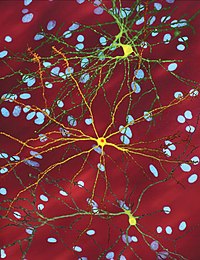
Photo from wikipedia
OBJECTIVE To develop a very brief scale with selected items from the Insomnia Severity Index (ISI), and to investigate the psychometric properties of the proposed scale in a psychiatric sample.… Click to show full abstract
OBJECTIVE To develop a very brief scale with selected items from the Insomnia Severity Index (ISI), and to investigate the psychometric properties of the proposed scale in a psychiatric sample. METHODS Patient data from seven Cognitive Behavioral Therapy (CBT) for insomnia trials and from regular care were used in psychometric analyses (N = 280-15 653). The samples included patients screening (N = 6936) or receiving treatment (N = 1725) for insomnia and other psychiatric conditions. Six criteria relating to component structure, sensitivity to change and clinical representativeness were used to select items. Psychometric analyses for the proposed very brief scale were performed. RESULTS One item representing satisfaction/dissatisfaction with current sleep pattern and one item representing interferences with daily functioning, were selected to create the 2-item ISI version. Correlations with the full scale were high at screening, pre and post, and for change (0.82-0.94). Categorical omega was ⍵C = 0.86. With a cut-off of 6 points, the scale could detect Insomnia Disorder with a sensitivity of 84% and a specificity of 76%, which was close to the full ISI showing 86% and 80% respectively. CONCLUSIONS The systematic psychometric evaluation based on a large sample from different contexts makes the proposed 2-item ISI version (ISI-2) a strong candidate for a very brief scale measuring insomnia, both for detecting cases and for measuring change during CBT with an overall high discriminative validity. ISI-2 is especially useful in clinical settings or population studies where there is a need to measure more than one condition at a time without overburdening patients. CLINICAL TRIALS Trials used in this analysis: ClinicalTrials.gov identifier: NCT01105052 (https://www.clinicaltrials.gov/ct2/show/NCT01105052) (sample b), ClinicalTrials.gov identifier: NCT01256099 (https://clinicaltrials.gov/ct2/show/NCT01256099) (sample c and d), German clinical trial (DRKS), registration ID: DRKS00008745 (https://www.drks.de/drks_web/navigate.do?navigationId=trial.HTML&TRIAL_ID=DRKS00008745) (sample e), ClinicalTrials.gov identifier: NCT01663844 (https://clinicaltrials.gov/ct2/show/NCT01663844) (sample f and g), ClinicalTrials.gov Identifier: NCT02743338 (https://clinicaltrials.gov/ct2/show/NCT02743338) (sample h).
Journal Title: Sleep medicine
Year Published: 2021
Link to full text (if available)
Share on Social Media: Sign Up to like & get
recommendations!